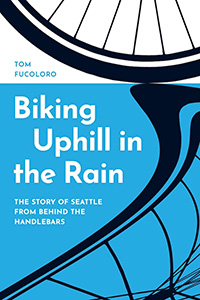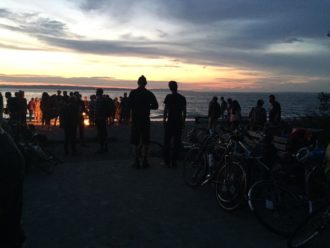 Transit is extremely popular in Seattle.
Transit is extremely popular in Seattle.
More than 80 percent of voters approved Prop 1, which would expand the sales tax to fund bus transit service hours, infrastructure improvements and access programs in Seattle. And considering 9 in 10 registered voters weighed in on this election, that’s a pretty epic mandate from the people of our city.
Congratulations to Transportation Choices Coalition and everyone who worked on the Yes For Transit campaign.
There should never again be any consternation about a transit improvement project or question about whether the public would support a significant change to a roadway in order to improve transit service and reliability.
The result is also frustrating in a way because it makes clear that a far more ambitious transit package would have easily passed. A King County measure would also have passed, but County leaders declined to run one.
But because the state legislature failed to legalize other taxing options for local transportation benefit districts and the WA Supreme Court had not yet ruled on the constitutionality of I-976 (it was ruled unconstitutional well after the deadline to submit a proposition to voters), Seattle had to go with a proposition that cut the vehicle license fee and relied on a regressive sales tax. And though the City Council could have sought a full 0.2% sales tax, they instead decided to raise the Mayor’s proposed 0.1% tax to 0.15%. Think about that for a second. Mayor Jenny Durkan wanted a smaller version of a transit measure that 80% of voters ended up approving, with her office calling her smaller proposal “fiscally prudent” in an SDOT Blog post back in July:
At a time of great economic challenge, the new Transportation Benefit District package proposed today aims to both right-size our transit investment to be fiscally prudent on our path to economic recovery, while doing our best to protect the all-day transit service that is essential to building back stronger than ever before.
“Right-size.” Cutting transit is not the “right size” for meeting our growing city’s climate, mobility and equity goals. Times got hard, so Mayor Durkan wanted to retreat. But the people of Seattle were like, “Hell no don’t run, let’s fix this problem.” Voters would have gone for much more if given the chance. Mayor Durkan is hopelessly out of touch with this city, and I’m glad the Council was there to increase her proposal.
But the result is that transit will still be cut compared to 2019. It also means that the work to fund transit is not over. 2021 is going to be a rough year for transit agencies. Passing Prop 1 helps, but we need a larger and more stable funding source for transit. We need the state legislature to make more funding options available to these local transportation districts, and we need an ambitious county-wide funding effort. Because Seattle’s transportation needs don’t stop at the city limit.
Transit and transportation fared well across the nation on election night, and not just because Joe Biden loves Amtrak. Funding from the Federal level is once again back on the table, which feels good. But local voters also approved ambitious measures, including Austin’s very interesting two-part vote: Prop A was a $7 billion property tax measure to fund light rail and bus rapid transit lines, and Prop B was a $460 million measure for sidewalks, bikeways, trails and traffic safety work. And though both passed easily, Prop B was even more popular with 67% approval compared to 58% for Prop A.
I am particularly inspired to see the Prop B result, since Austin has shown that even in Texas you don’t need to pack a bunch of car-centric stuff into a transportation measure to pass it. Many walking, biking and transit investments promised by the 2015 Move Seattle Levy vote face delays and cuts while major high-dollar car-centric projects got priority. Perhaps we need to rethink how we fund these projects in our city. And we also need to go a lot bigger. The Move Seattle Levy is set to expire at the end of 2024, the first time the 9-year levy renewal pattern will fall on a very-high-turnout Presidential election year.
I know four years feels like a long time from now, but it’s not too early to start strategizing for what needs to be an unprecedented investment in walking, biking and transit, a measure larger than any the United States has seen before. We need to assess, in partnership with a wide range of community organizations, the realistic costs for what it will take to truly achieve our city’s climate, safety and transportation equity goals. What do we need to invest in order to sustainably accommodate our growth? What is needed to fund the transportation portions of an equitable Green New Deal? It is going to be a very big number. But we should go for it on the 2024 ballot.
The mayor Seattle elects in 2021 will lead the 2024 transportation measure, and work to identify good candidates is either underway or is starting soon. Expect transportation to be a bigger issue this time than it was in 2017.










Comments
One response to “Yeah, there was no need to be worried about Seattle voting for transit”
Out of curiosity, how did Prop 1 do in Seattle relative to Joe Biden? Past Seattle transit measures passed by big margins, but still noticeably less than the margin by which Seattle elects Democrats.
This time, 87% looks to be on par if not exceeding Hillary Clinton’s margin in the city.
Across all of King County, Joe Biden seems to have won about 75% of the vote, which means a countywide transit measure would need the support of at least 2/3 of Biden voters to pass (assuming all Trump voters vote “no”). At least if Seattle is a precedent, this suggests it’s possible, but I’m not sure how applicable the conclusion is countywide. For instance, a quick glance at Pierce and Snohomish numbers shows a lot of people that voted for both Joe Biden and I-976.